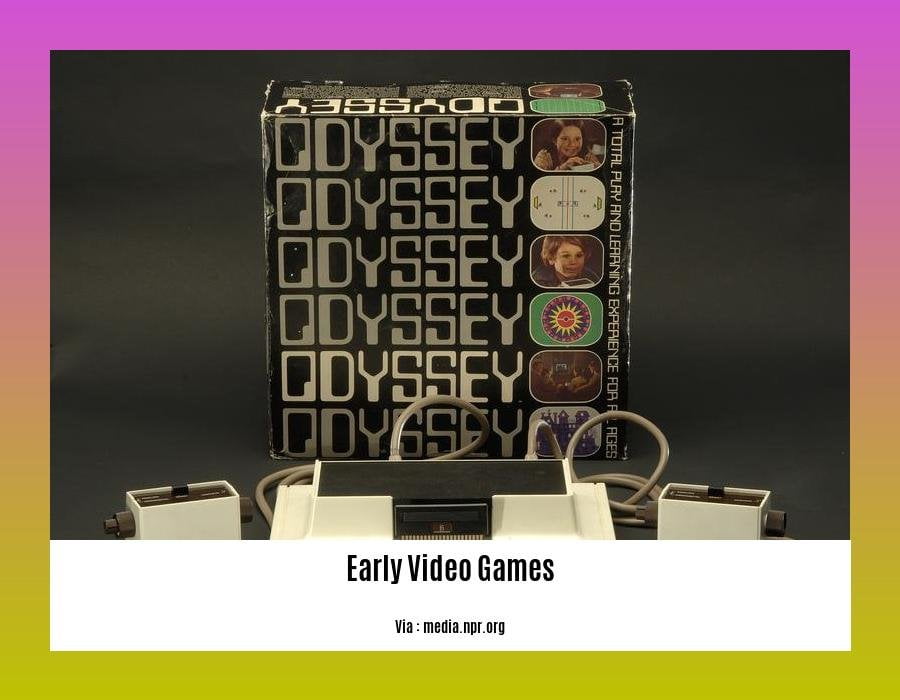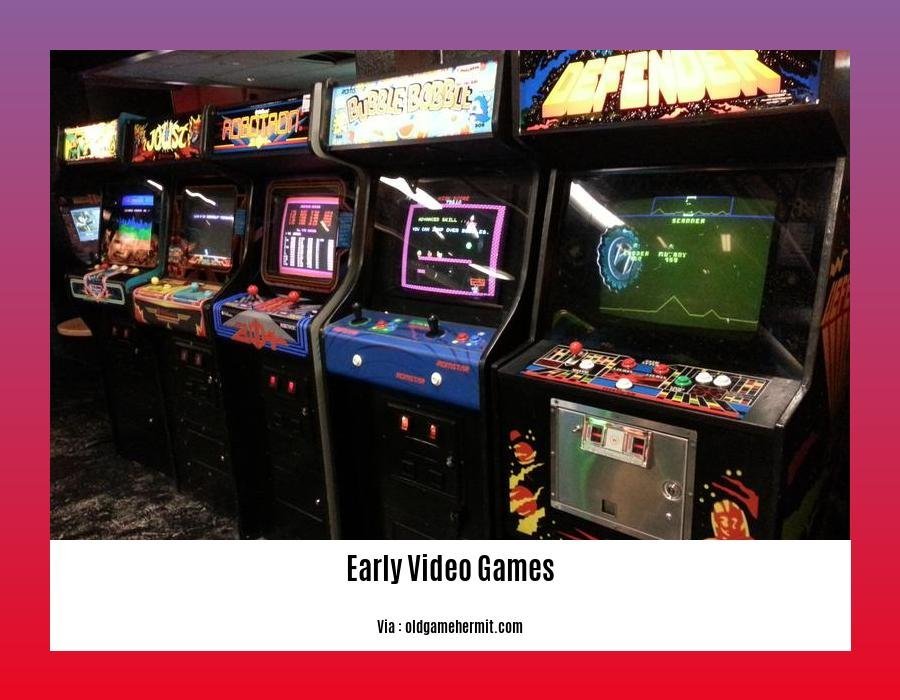Dive into the annals of gaming history with “Chronicling the Dawn of Digital Entertainment: Early Video Games and Their Enduring Legacy.” This comprehensive article explores the pivotal role that early video games played in shaping our digital entertainment landscape.
Key Takeaways:
- The term “video game” originally referred to games outputting video signals to displays.
- The definition of “video game” has broadened to encompass games played on any hardware using electronic logic.
- The earliest digital computer games were developed during World War II.
- “OXO,” a tic-tac-toe simulation, was created on the EDSAC computer in 1952.
- The popularity of video games surged in the 1970s and 1980s with the rise of arcade games, consoles, and home computer games.
Early Video Games: Pioneers of Digital Entertainment

Origins and Rise to Popularity
The genesis of video games can be traced back to the earliest electronic digital games developed during World War II. The term “video game” originally referred to games displayed on video screens but has since evolved to encompass any electronic games. The 1970s and 1980s witnessed a surge in the popularity of arcades, home consoles like the Atari 2600 and NES, and home computer games, solidifying video games as a dominant form of entertainment.
Technological Advancements
Raster Graphics: This technique allowed for the creation of bitmap images, enabling more complex and detailed visuals.
Color Display: The introduction of color displays brought vibrancy and realism to video games.
Sound Capabilities: The addition of sound and music enhanced the immersive experience, creating a captivating atmosphere.
Impact on Popular Culture
A New Paradigm of Entertainment: Early video games introduced a revolutionary form of entertainment, captivating players with interactive experiences and a sense of escapism.
Inspiration for Future Developers: The pioneers of early video games inspired countless generations of game developers, who built upon their innovations to create the modern gaming landscape.
If you want to know the fascinating journey of gaming, immerse yourself in the history of gaming to explore the evolution of gaming consoles](../evolution-of-gaming-consoles). Moreover, don’t miss the section that explores the impact of gaming on society, which provides thought-provoking insights.
Cultural Impact of Early Video Games
Beyond the pixels and joysticks, the Cultural Impact of Early Video Games is a fascinating journey into the transformative power of digital entertainment. These groundbreaking innovations shaped not only the gaming industry but also the very fabric of our lives.
Key Takeaways:
- Cultural Expression: Early video games gave rise to new forms of storytelling, creativity, and self-expression.
- Shared Experiences: They fostered a sense of community, connecting players across geographical boundaries and generations.
- Technological Innovation: These games pushed the boundaries of technology, driving advancements in graphics, sound, and gameplay.
- Educational Value: Some early video games offered educational experiences, promoting problem-solving, critical thinking, and spatial reasoning.
- Cultural Reflection: Early video games often reflected the societal norms and beliefs of their time.
These early pioneers of digital entertainment left an enduring legacy, inspiring future game developers, influencing popular culture, and continuing to bring joy to generations of gamers.
Preserving and Celebrating Gaming History

From the rudimentary beginnings of Pong to the immersive worlds of modern gaming, early video games have left an indelible mark on our digital landscape. They were the pioneers that sparked a revolution in entertainment, shaping the way we interact with technology and each other.
Key Takeaways:
- Early video games paved the way for a new form of entertainment, offering escapism and interactive experiences.
- Technological advancements, such as raster graphics and sound capabilities, transformed gaming into a visually stunning and engaging medium.
- Preserving and Celebrating Gaming History is crucial for understanding the cultural significance and impact of video games.
- By archiving and documenting early gaming experiences, we safeguard a vital part of our digital heritage for future generations.
- Video games have influenced popular culture, inspired creativity, and connected people worldwide, making them a valuable part of our cultural fabric.
Relevant URL Source:
Repairing and Maintaining Classic Consoles
Understanding the Importance of Preserving Gaming History
Classic consoles are not just nostalgic relics; they represent the foundation of modern gaming. They paved the way for the immersive digital worlds we enjoy today. Repairing and Maintaining Classic Consoles is crucial for preserving this gaming heritage for future generations.
Key Takeaways:
- Classic consoles hold cultural and historical significance.
- Repairing them ensures the preservation of gaming artifacts.
- Maintaining them supports research and education in gaming history.
- Collaborative efforts among archivists, gamers, and historians are essential for preservation.
By supporting video game preservation through donations, advocacy, and educational outreach, we contribute to safeguarding the legacy of these iconic devices.
Step-by-Step Guide to Console Repairs
Preparation:
- Gather necessary tools (screwdriver, cleaning supplies, etc.).
- Wear anti-static gear to prevent damage to sensitive components.
Troubleshooting:
- Identify symptoms (e.g., no power, faulty controller).
- Refer to online resources or forums for specific console issues.
Cleaning:
- Remove dust and debris with compressed air or a soft brush.
- Clean cartridge contacts and console board with isopropyl alcohol.
Component Replacement:
- Check for malfunctioning components (e.g., power supply, capacitors).
- Replace parts with compatible and high-quality replacements.
Calibration:
- Adjust knobs or dials to ensure proper audio and video output.
Best Practices for Console Maintenance
- Store consoles in a dry and well-ventilated environment.
- Keep them protected from extreme heat or cold.
- Avoid excessive use to prevent overheating.
- Clean consoles regularly to prevent dust buildup.
Remember, Repairing and Maintaining Classic Consoles is a rewarding hobby that helps preserve a vital part of our gaming history. By following these steps and best practices, you can keep your beloved consoles up and running for years to come.
Relevant URL Source:
FAQ
Q1: When did video games first emerge?
A1: The first electronic digital computer games were developed during World War II, with OXO simulating tic-tac-toe on the EDSAC computer in 1952.
Q2: How have video games evolved over time?
A2: Video games have transitioned from simple text-based games to visually stunning experiences with complex storylines and immersive gameplay. The introduction of consoles and home computers in the 1970s and 1980s popularized gaming beyond arcade settings.
Q3: What is the significance of early video games?
A3: Early video games laid the foundation for the massive industry we see today. They pushed technological boundaries, introduced innovative gameplay concepts, and shaped the cultural landscape by providing new forms of entertainment and escapism.
Q4: Why is preserving video game history important?
A4: Video game preservation is vital for cultural and historical documentation. It ensures the accessibility of these influential artifacts for future generations, facilitating research, education, and the appreciation of their historical significance.
Q5: How can I contribute to video game preservation?
A5: You can support organizations like the Video Game History Foundation through donations, advocacy, and educational outreach. Additionally, responsible storage, proper handling, and sharing of vintage games and consoles contribute to the preservation efforts.
- China II Review: Delicious Food & Speedy Service - April 17, 2025
- Understand Virginia’s Flag: History & Debate - April 17, 2025
- Explore Long Island’s Map: Unique Regions & Insights - April 17, 2025
















